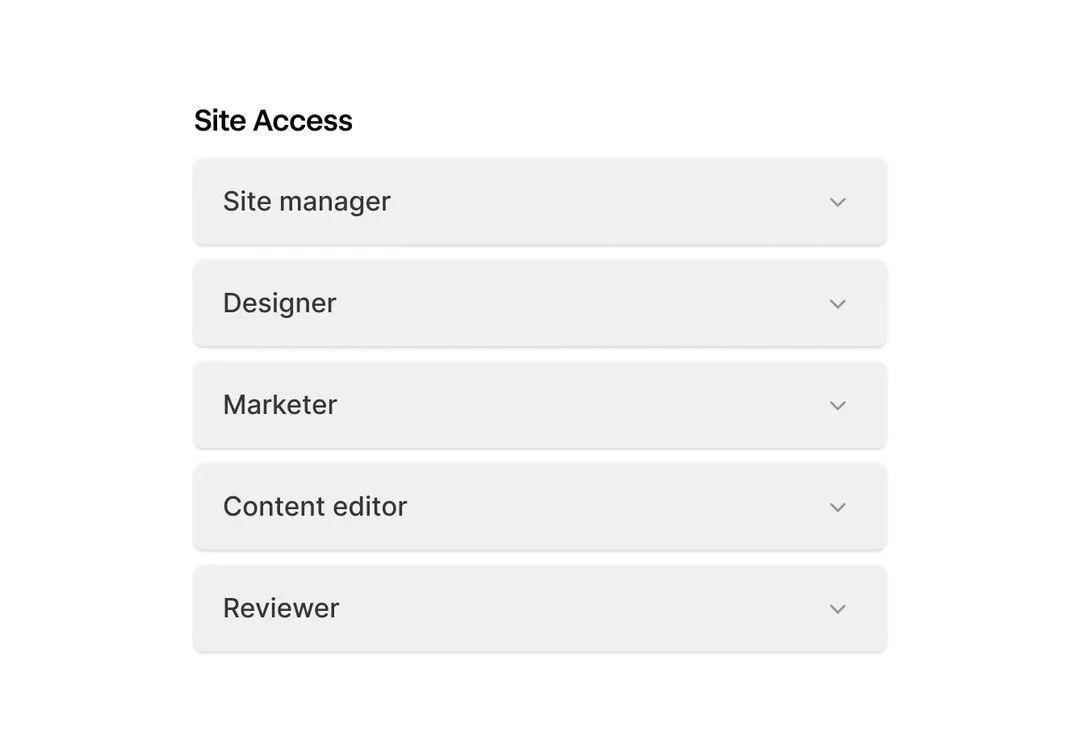Structuring your seats
As you start inviting users, there are two key things to keep in mind:
- How many seats you have
- What type of seat tiers you’ve purchased — this impacts which roles you can assign.
There are three seat types:
For Admin, Site Manager, Designer, or any custom role based on the Designer role
For Marketer, content editor, or custom roles based on the Marketer and content editor roles
- Reviewer role (and custom roles based on the Reviewer role)
- Guest role — for external collaborators (e.g., agencies) — read more here
For Enterprise workspaces, your Webflow account team can provide guidance on how to add more seats. On other workspace plans, you can add seats individually as needed.
Example setup
You’re the Web Team Lead at an enterprise company managing a large-scale Webflow workspace. You’ll be assigned the Admin role, which is included as one full seat in your workspace plan.
Full seats
Your team includes three experienced Designers (creating pages, components, and design systems), one Junior Designer (learning and supporting builds with scoped permissions), a Developer (adding custom code and managing integrations), and a Security/IT Admin (handling SSO, SCIM, and audit logs).
To support these roles and plan for growth, you purchase 10 full seats.
Limited seats
You’re also bringing on two Marketers (running A/B tests and building landing pages using pre-built components) and two content editors (writing and updating CMS and static content).
To support these roles and plan for growth, you purchase 10 limited seats.
Free seats
You expect occasional feedback from stakeholders like Legal, the Director of Marketing, and the Brand Manager. You’ll assign these users to three free Reviewer seats.
Let's go deeper into how to decide which roles in Webflow are the best fit for the different members of your team.
Person
What they need to do
Seat Type
Webflow role
Web Team lead
Other Job Titles: Design Lead, Senior Manager of Web, IT Admin, Security Admin, Software Lead, Growth Marketing Team Lead
- Own and manage the company’s Webflow account
- Set up team access and roles
- Manage seats, billing, and account-level settings
Full seat
Admin
Security/IT admin
Other Job Titles: IT Engineer, SecOps, Security Engineer
- Ensure workspace compliance and security
- Configure and monitor access controls and permissions
- Manage audit logs and integrations with security tools (IdP, SIEM)
Full seat
Admin
Web designer
Other Job Titles: Brand Designer, Web Developer
- Create beautiful sites and design systems with Webflow’s full design capabilities
Full seat
Designer
Developer
Other Job Titles: Web Engineer, Software Engineer, Site Developer
- Integrate Webflow with external systems and APIs
- Add custom code and advanced interactions
- Use Webflow Cloud to deploy fullstack apps
- Ensuring performance and technical standards
Full seat
Designer
Growth Marketers
Other Job Titles: Demand Generation Specialist, Performance Marketer, Event Marketer, Product Marketer
- Create and optimize landing pages in Build mode
- Launch A/B tests
- Execute campaigns
- Analyze effectiveness of pages/campaigns/etc.
- Launch products
Limited seat
Marketer
Content editor
Other Job Titles: Content Marketer, Copywriter, Content Strategist, Translator, Legal
- Create or update content on the website — text, images, etc.
- Often responsible for updating dynamic content in specific CMS Collections
Limited seat
Content editor
Reviewers
Other Job Titles:
CMO, Brand Manager, Product Manager, CEO, Legal, HR, Client Services
- Preview the site to review how it looks and performs as it should
- Leave feedback on the website with comments
Free seat
Reviewer
Custom roles
If you’re a Webflow Enterprise customer, you can also create tailor-made roles to fit your team’s needs. You start with a base role (like Designer or content editor) and toggle configurable permissions on or off based on what a person actually needs to do. There are hundreds of combinations possible (more details here), but here are a few of the most common custom roles that we’ve seen Webflow customers creating:
Custom role name
Target persona
Base role and permissions
Junior Designer
For more risk-averse teams that want to restrict the Junior Designers’ ability to edit the design system and publishing abilities.
Designer base role with no access to site settings, design system settings, and no ability to publish to production (staging only)
Limited content editor
For more risk-averse teams that want to restrict their content editors to just drafting content updates, with no publishing permissions in the CMS.
Content editor base role but cannot publish site nor CMS items
Marketer (requires approval)
For more risk-averse teams that want changes made by marketers to be approved before going live.
Marketer base role with “can make changes without approval” unchecked
Access controls
Defining where users can work in Webflow
Site specific access
By default, sites are restricted — only workspace owners and admins and explicitly invited users can access them. As an admin, you can choose to change this setting per site to allow anyone in the workspace to access it. Or you can change the default setting that determines if all newly-created sites are open or restricted by default.
Note: This feature is only available on Growth, Agency, Freelancer, and Enterprise workspaces. It is not available on Starter or Core.
Recommendations for when to use restricted vs. open site access
If...
Then...
You’re a small team of designers working on all sites in the workspace
You can set access to all sites as open to everyone in the workspace
You are a team with a mix of different user types and/or stricter access needs
Keep sites restricted and grant access per user (e.g., when you have different team members working on a marketing site vs. a community site)
You’re an agency with many designers working on separate projects
Keep sites restricted to limit each designer’s access to their assigned site project only
You’re inviting a freelancer to your workspace to work on a specific site
Keep sites restricted to ensure the freelancers’ access is just to the site they should work on
You’re an agency inviting a client to review progress on their site in your workspace
Keep sites restricted so clients only sees their site, not others in the workspace
In short: restricted site access is recommended for most use cases.
And if you ever start with open access, no worries. As an admin, you can always bulk reset all sites to “restricted” in your Workspace settings.
Page-specific access control
By default, when a user has access to a site, they can edit all pages within that site. But in many cases, you may want to limit their editing or designing capabilities to specific pages (learn more). For example:
Need
Setup
Only a handful of teammates should be able to work on the Home page
Assign that group access to the Home page, and restrict everyone else from it
The monetization team needs to be able to update the Pricing page, and nothing else
Assign each member of the Monetization team access to the Pricing page, and restrict them from the rest
External partners or third-party contractors should only work on certain pages
Assign them access to just the pages that apply to them, and restrict them from the rest
CMS Collection access control
By default, when a user has access to a site, they can edit all CMS Collections within that site. But in many cases, you may want to limit their editing capabilities to specific collections (learn more). For example:
Need
Setup
A product marketer should only be able to add new product releases on their site
Assign the content editor role → Restrict their edit access to just the Product Updates CMS Collection
A marketer should only be able to add blog content on their site
Assign the Marketer role → Restrict their edit access to just the Blog CMS Collection
The HR team only needs to be able to upload and update job listings
Assign the content editor role → Restrict their edit access to just the Job Listings CMS Collection
.jpg)
In the site access settings, you can manage what Pages and CMS Collections individual users have access to.
Next up: Designing as a team
Designing in Webflow is seamless and efficient for teams of all sizes.
More ways to level up
- Help Center
Find solutions to your Webflow questions and get help from our expert customer support team.
Go to docs - Community
Connect with other designers and developers to share tips, ask questions, and show off your work.
Go to forum






